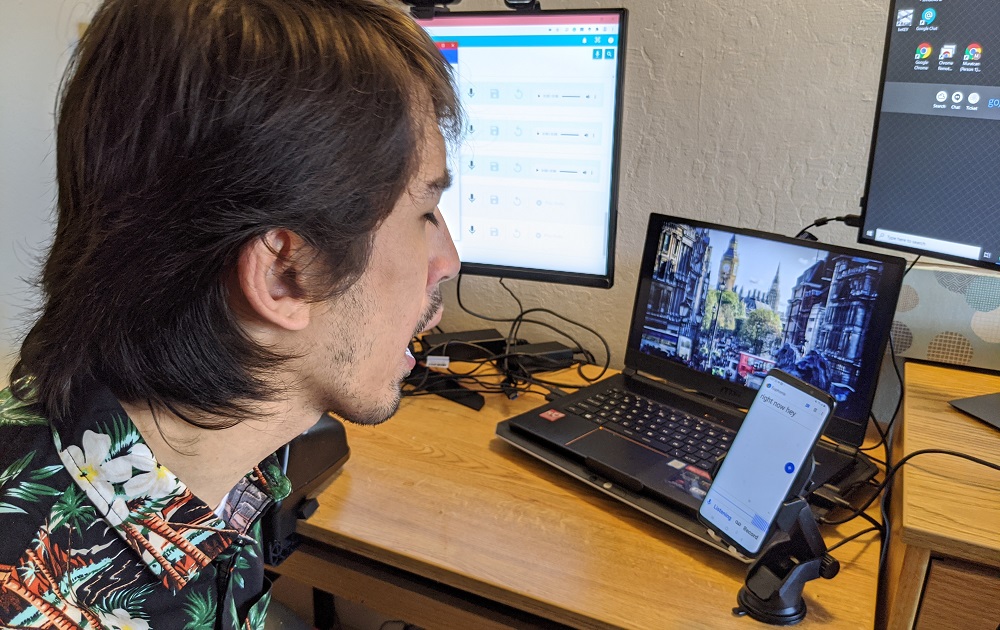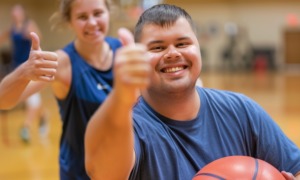Muratcan Cicek got his hopes up when, as a high school student, he first heard about automated speech recognition devices. His excitement was fleeting.
“It is still my biggest disappointment,” said Cicek, a 27-year-old with cerebral palsy, of how that evolving software still doesn’t work for people like him with severely impaired speech.
 Many among the 7.5 million people in the United States with such impediments can’t use such speech recognition devices as Alexa or Siri. Even deaf people who speak well, but with accents unlike those of hearing people, find them problematic.
Many among the 7.5 million people in the United States with such impediments can’t use such speech recognition devices as Alexa or Siri. Even deaf people who speak well, but with accents unlike those of hearing people, find them problematic.
Critics, including developers and speech-impaired users of existing voice recognition gadgets, said the devices — even if not intentionally — have a built-in bias against people with disabilities. That’s mainly because the devices’ algorithms haven’t been developed with examples from people with speech impairments, the United Spinal Association concluded.
However, Google’s Project Euphonia has been testing a prototype that, by mid-June, employed the voices of roughly 1,000 disabled individuals, including Cisek, who was born and reared in Turkey but is studying for his doctorate at the University of California at Santa Cruz.
“I cannot describe it because it was a dream-come-true moment,” computer engineering student Cicek recalled, speaking of the opportunity to use a prototype. “I have been waiting for this technology so long that I forgot it was possible.”
Google is aiming to enroll 5,000 more people whose speech patterns will be included in that database, a company official said.
SOME RELY HEAVILY ON COMPUTERS TO COMMUNICATE
Unlike Cicek, some people with disabilities rely almost entirely on computers to communicate. They include people who cannot talk at all, those whose speech had always tended to be unintelligible or who slowly lost their speech to muscular dystrophy, Lou Gehrig’s disease or other progressively paralyzing neuromuscular disorders.
Google isn’t the only endeavor aiming to assist them. Voiceitt recently launched a $199-per-year app for Apple smartphones. Company officials said people with non-standard speech can train the app’s virtual speech assistant to learn their unique speech patterns. A version of Voiceitt for Android users is slated to be released in late 2021.
That kind of artificial intelligence is designed to bridge a major gap for people with mobility impairments and neurological conditions, said Julie Cattiau, product manager at AI for Social Good, a Google program tackling such human and social challenges as severe speech impediments.
Smart speakers can give people with mobility impairments more independence, for example, she said, “allowing them to turn the lights on [or] off or change the temperature without having to physically do those actions. But, for people with neurologic conditions like ALS, cerebral palsy or muscular dystrophy, speech recognition may not be reliable today.” (ALS is another name for Lou Gehrig’s disease.)
By making it easier for people with speech impairments to communicate, personalized speech technology also can help fortify their connections with friends, relatives, caregivers or co-workers, Cattiau said.
VOICEITT AIMS TO WORK WITH ANY SPEECH RECOGNITION DEVICE
The Voiceitt app is designed to be used with any speech recognition technology; and Voiceitt Smart Home can be integrated with Amazon’s Alexa virtual assistant, said David Hoffman, Voiceitt’s spokesperson. A team of speech and language experts study speech samples to calibrate and refine Voiceitt’s algorithms.
The company offers a free trial of the Voiceitt app, which eventually costs $199 annually. But that may be a high price tag for many disabled people. The average yearly income of U.S. residents with disabilities was $43,300 in 2016, when the respective number was $68,700 for people without disabilities, according to the Americans With Disabilities Act Participatory Research Consortium. Many youth and young adults with disabilities also get some form of government assistance.
In light of those economic realities, spokesperson Hoffman wrote in an email to Youth Today, “Voiceitt has decided to offer the full app for free during the launch period to mitigate some of the hardships created by the pandemic and improve the quality of life for those affected.
He added that Voiceitt is collaborating with government agencies and nonprofits to find ways to subsidize those costs; and that it plans to ask for corporation donations to nonprofits working with speech-impaired people with disabilities.
GRAD STUDENT: GOOGLE’S PROTOTYPE BETTERS LIFESTYLES
Cicek, the Santa Cruz graduate student, said using Google’s prototype of the personalized speech model already is paying off for him. He’s secured a new job and begun a romance that’s lasted longer than any he’s had before. He attributes that to being better understood when he speaks.
“Euphonia supports my independence while I am out alone [in my wheelchair] as I can now communicate with bus drivers or bartenders without any problem,” Ciscek said. “I especially benefit from it during job interviews since it is also adopted to capture technical terms I frequently use and need to mention during the technical interviews.”
Because he has difficulty handling the equipment by himself, Cicek can’t use it in every situation. Also, the prototype accurately translates his speech only around 70% of the time, he said.
Still, he’s glad about improvements being made to automated speech recognition, especially its potential to meet the needs of people with an array of speech impairments.
































